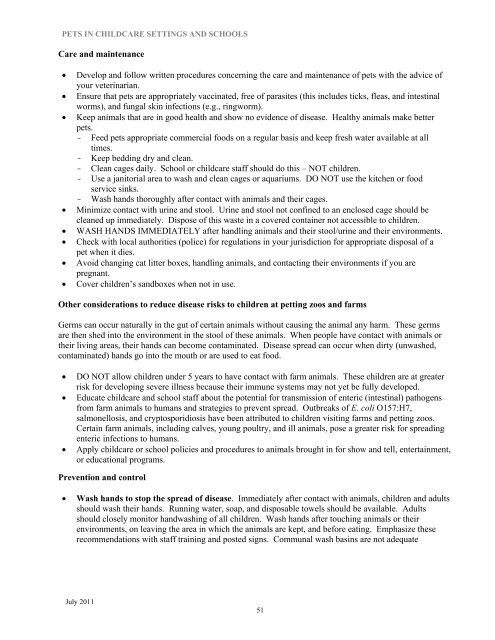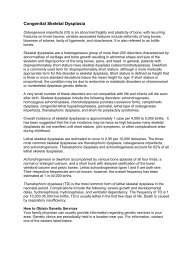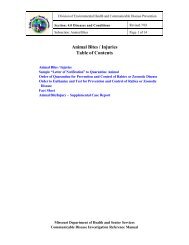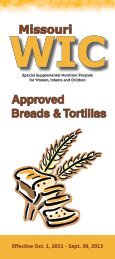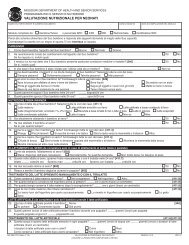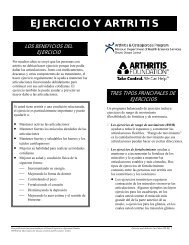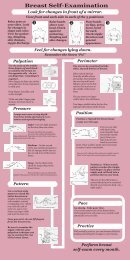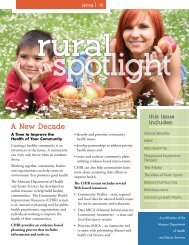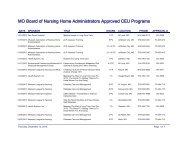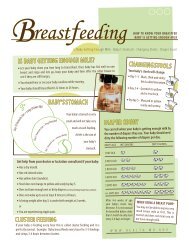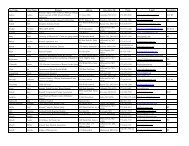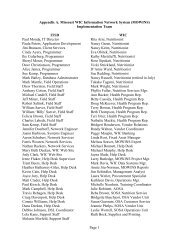Prevention and Control of Communicable Diseases - Missouri ...
Prevention and Control of Communicable Diseases - Missouri ...
Prevention and Control of Communicable Diseases - Missouri ...
Create successful ePaper yourself
Turn your PDF publications into a flip-book with our unique Google optimized e-Paper software.
PETS IN CHILDCARE SETTINGS AND SCHOOLS<br />
Care <strong>and</strong> maintenance<br />
� Develop <strong>and</strong> follow written procedures concerning the care <strong>and</strong> maintenance <strong>of</strong> pets with the advice <strong>of</strong><br />
your veterinarian.<br />
� Ensure that pets are appropriately vaccinated, free <strong>of</strong> parasites (this includes ticks, fleas, <strong>and</strong> intestinal<br />
worms), <strong>and</strong> fungal skin infections (e.g., ringworm).<br />
� Keep animals that are in good health <strong>and</strong> show no evidence <strong>of</strong> disease. Healthy animals make better<br />
pets.<br />
- Feed pets appropriate commercial foods on a regular basis <strong>and</strong> keep fresh water available at all<br />
times.<br />
- Keep bedding dry <strong>and</strong> clean.<br />
- Clean cages daily. School or childcare staff should do this – NOT children.<br />
- Use a janitorial area to wash <strong>and</strong> clean cages or aquariums. DO NOT use the kitchen or food<br />
service sinks.<br />
- Wash h<strong>and</strong>s thoroughly after contact with animals <strong>and</strong> their cages.<br />
� Minimize contact with urine <strong>and</strong> stool. Urine <strong>and</strong> stool not confined to an enclosed cage should be<br />
cleaned up immediately. Dispose <strong>of</strong> this waste in a covered container not accessible to children.<br />
� WASH HANDS IMMEDIATELY after h<strong>and</strong>ling animals <strong>and</strong> their stool/urine <strong>and</strong> their environments.<br />
� Check with local authorities (police) for regulations in your jurisdiction for appropriate disposal <strong>of</strong> a<br />
pet when it dies.<br />
� Avoid changing cat litter boxes, h<strong>and</strong>ling animals, <strong>and</strong> contacting their environments if you are<br />
pregnant.<br />
� Cover children’s s<strong>and</strong>boxes when not in use.<br />
Other considerations to reduce disease risks to children at petting zoos <strong>and</strong> farms<br />
Germs can occur naturally in the gut <strong>of</strong> certain animals without causing the animal any harm. These germs<br />
are then shed into the environment in the stool <strong>of</strong> these animals. When people have contact with animals or<br />
their living areas, their h<strong>and</strong>s can become contaminated. Disease spread can occur when dirty (unwashed,<br />
contaminated) h<strong>and</strong>s go into the mouth or are used to eat food.<br />
� DO NOT allow children under 5 years to have contact with farm animals. These children are at greater<br />
risk for developing severe illness because their immune systems may not yet be fully developed.<br />
� Educate childcare <strong>and</strong> school staff about the potential for transmission <strong>of</strong> enteric (intestinal) pathogens<br />
from farm animals to humans <strong>and</strong> strategies to prevent spread. Outbreaks <strong>of</strong> E. coli O157:H7,<br />
salmonellosis, <strong>and</strong> cryptosporidiosis have been attributed to children visiting farms <strong>and</strong> petting zoos.<br />
Certain farm animals, including calves, young poultry, <strong>and</strong> ill animals, pose a greater risk for spreading<br />
enteric infections to humans.<br />
� Apply childcare or school policies <strong>and</strong> procedures to animals brought in for show <strong>and</strong> tell, entertainment,<br />
or educational programs.<br />
<strong>Prevention</strong> <strong>and</strong> control<br />
� Wash h<strong>and</strong>s to stop the spread <strong>of</strong> disease. Immediately after contact with animals, children <strong>and</strong> adults<br />
should wash their h<strong>and</strong>s. Running water, soap, <strong>and</strong> disposable towels should be available. Adults<br />
should closely monitor h<strong>and</strong>washing <strong>of</strong> all children. Wash h<strong>and</strong>s after touching animals or their<br />
environments, on leaving the area in which the animals are kept, <strong>and</strong> before eating. Emphasize these<br />
recommendations with staff training <strong>and</strong> posted signs. Communal wash basins are not adequate<br />
July 2011<br />
51


